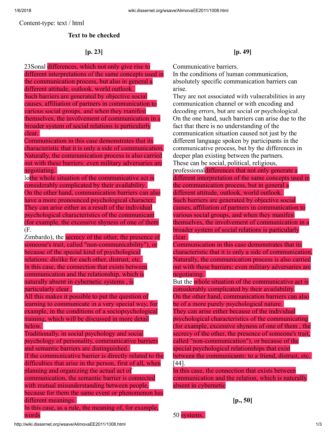In 2013, three Russian academics and one journalist launched Dissernet, a project aimed at exposing plagiarism in academia. Last week Wednesday (Jan. 17, 2018) they released a report summarizing their findings and exposing the systematic nature of academic fraud in Russia.
Dissernet report: The Structure of the Dissertation Industry in Russia
“On our server we have 7,500 fake degrees, 500 universities issuing fake degrees, 4,500 fake scholarly papers and 522 journals that published fake papers,” said Dr. Andrej Zayakin, one of Dissernet’s founders. “There are 22,000 persons involved, namely thesis authors, supervisors and referees.”
Many of the degrees granted to Russia’s lawmakers and officials are based on plagiarized work. Academic journals do not meet internationally-recognized standards such as peer-review requirements.
“We had never realized there is so much of it,” Zayakin said. “Then after discovering the plagiarized theses of Ministers of Parliament, we started thinking it was limited to state officials who had purchased their degrees.”
But the scope of plagiarism in academia extends far beyond issuing degrees to government officials.
“However, we soon realized that the diploma and degree mills were producing much more fake degrees “for internal use,” for example for those who were serving as ghost writers for MPs,” Zayakin said.
Anna Abalkina, a coordinator at Dissernet, dubbed this the “the educational-scientific-production complex” on her Livejournal website.
The three other founders of Dissernet are Mikhail Gelfand, a doctor of biological sciences; Andrey Rostovtsev, a doctor of physical and mathematical sciences; and Sergey Parkhomenko, a Russian journalist, commentator and publisher.
Andrej Zayarkin holds a PhD in physical and mathematical sciences from the University of Munich.
Bittersweet Impact
On Dec. 20, 2017, Haydar Valeev, Chairman of the Central Election Commission of the Republic of Bashkortostan, was deprived of his doctoral degree after Dissernet asked the Dissertation Council of St. Petersburg State University to look into Valeev’s dissertation.
The council found that less than 35 percent of Valeev’s paper was original.
Around 200 pages of Valeev’s 2011 doctoral dissertation are partially or entirely “borrowed” from a 2009 thesis, according to Dissernet’s analysis.
Analysis of plagiarism in Haydar Valeev’s thesis
There are universities with over 200 cases of plagiarism and professors who have endorsed over 30 “colorful theses.”
Only a few universities were ready to fire academics following Dissernet’s exposures.
“We have cooperated with the Higher School of Economics in Moscow, who removed the few plagiarists they had from faculty positions,” Zayakin said. “The Financial University in Moscow has also sacked or caught 12 professors but the rest of Russian universities ignore us.”
Out of 400 requests to universities to withdraw degrees, 100 were successful and of the 200 requests to retract articles from journals only several dozen came through.
“The bettermost part of our activity is the war we wage against the fake journals,” Zayakin said. “A volunteer has received life threats for exposing the non-academic practices of such journals.”
List of universities by number of plagiarism cases
Much of the plagiarism Zayakin and his colleagues encountered is unsophisticated and obvious. In many cases, works from a certain field, say biology, are used to create a thesis in another field such as anthropology. The author will systematically swap certain words to make the thesis appear to present original research in the relevant field.
A video depicting the complex network and interactions of people involved in questionable thesis defenses at the State University, formerly known as Orel State Technical University, in the Southwest of Russia:
Grades of Fraud
Plagiarism is usually noticed by supervisors, peer-reviewers and colleagues. The extend of dissertation fraud at these universities means that it involves academics from all levels.
Pytkin Alexander Nikolaevich ranks number one in approving plagiarized works. He supervised the defense of 40 problematic theses.
Many dissertations plagiarize the same research. Professors on thesis councils were repeatedly presented with research copied from the same papers but this did not seem to influence their decisions to grant degrees.
Take, for example, Abakumova Irina Vladimirovna, who was a supervisor at 14 more defenses of plagiarized theses.
Dissernet page on Vladimirovna
Some of the theses Vladimirovna supervised plagiarized the same work. Gazdiyeva Ada Aslambekovna and Gurov Sergey Viktorovich both used passages from Larina Tatyana Nikolaevna’s 2007 thesis “Psychological Deformations of the Semantic Sphere of Young Men who are in the Conditions of the Remand Center.”
Dissernet page on Aslambekovna

English translation of a side-by-side plagiarism comparison available on Dissernet.org
By using plagiarism detection software and creating a database of journals and theses, Dissernet was able to collect such a vast amount of plagiarized works.
On Dissernet’s wiki, you can open every page of the papers and compare them to the original work.
Vladimirovna also oversaw Alimova Elena Evgenievna’s dissertation for a Candidate’s Degree in Psychological Sciences.
Evgenievna is a Vice-Rector for Educational and Methodical work at the Rostov Institute for Advanced Studies and Professional Training of Educators, a learning center in Rostov-on-Don.
Her thesis has over 50 pages that are plagiarized.
Analysis of plagiarism in Evgenievna’s thesis
Dissernet features a database of Russian academic journals on its website.
This database includes
Dissernet’s database of academic journals
Zayakin started thinking about exposing plagiarism because of the Guttenberg Plagiarism Scandal in Germany.
In 2011, Germany’s Minister of Defense Karl-Theodor zu Guttenberg resigned after the University of Bayreuth revoked his doctorate because they found plagiarism in his dissertation.
“I was inspired by Baron von und zu Guttenberg’s case,” Zayakin said. “I saw how a liar was kicked out from the political scene just because of his lies.”
Süddeutsche Zeitung – “Guttenberg is said to have plagiarized his doctoral thesis”
Süddeutsche Zeitung – “Summa cum laude? – More than Flattering”
The findings by Dissernet have been featured in the Moscow Times, the New Yorker and the New York Times.
The Moscow Times – “Dissernet Ranks Russian Universities According to Plagiarism”
The Moscow Times – “Russia’s Culture Minister May Have ‘Absurd’ PhD Revoked”
The New York Times – “By Russian Standards, Melania Trump Would be a Plagiarism Amateur”